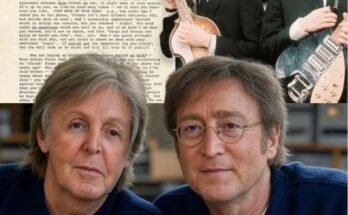In 1966, The Beatles were at the top of the world.
They had conquered America, turned pop music into high art, and packed stadiums with screaming fans everywhere they went.
By any measure, they were the biggest band in the world.
And then, without warning, they stopped touring.
No farewell tour. No final show announcement.
Just silence — and a band that never played live again… at least not as The Beatles.
So what happened?
The Screaming Was Just Too Loud
The short answer?
They couldn’t hear themselves play.
At first, Beatlemania was thrilling — mobs of adoring fans chasing cars, fainting at concerts, singing every lyric.
But soon, it turned into chaos.
During live shows, the screams from the audience were so loud that The Beatles couldn’t hear their own instruments — or even each other.
They were practically miming their performances.
Ringo Starr once joked that he had to watch John Lennon’s foot tapping to stay in time because he couldn’t hear the beat.
That wasn’t just frustrating — it was artistically stifling.
Dangerous, Exhausting, and Pointless?
Beyond the noise, there were other problems.
Their concerts were plagued by poor sound systems, limited security, and intense pressure.
Some venues had death threats, protests, and racial tension — especially during their U.S. tours.
The 1966 tour in particular was brutal.
It included a controversial backlash over John Lennon’s comment that The Beatles were “more popular than Jesus,”
which led to record burnings and even bomb threats.
The final straw?
A chaotic, exhausting concert in San Francisco’s Candlestick Park on August 29, 1966.
That became their last-ever public performance as a band.
Why Quitting Was the Right Call
Walking away from the road allowed The Beatles to become true artists in the studio.
Without the burden of touring, they created albums that wouldn’t have been possible live — like:
🎧 Sgt. Pepper’s Lonely Hearts Club Band
🎧 Magical Mystery Tour
🎧 The White Album
They used layered sounds, orchestras, tape loops, and effects that couldn’t be reproduced on stage in 1966.
Their creativity exploded the moment the screaming stopped.
A Bold Move That Changed Music Forever
Most bands dream of selling out arenas.
But The Beatles had the courage to say:
“This isn’t working — let’s do something new.”
That decision not only preserved their sanity,
it changed the direction of modern music, showing that studio recordings could be just as powerful as live shows.
Final Thought
At the height of their fame, The Beatles did the unthinkable:
They stepped off the stage.
Not because they were tired of the fans — but because they couldn’t truly be The Beatles anymore with all the noise.
And by stepping back, they went forward — making music that would echo for generations.



